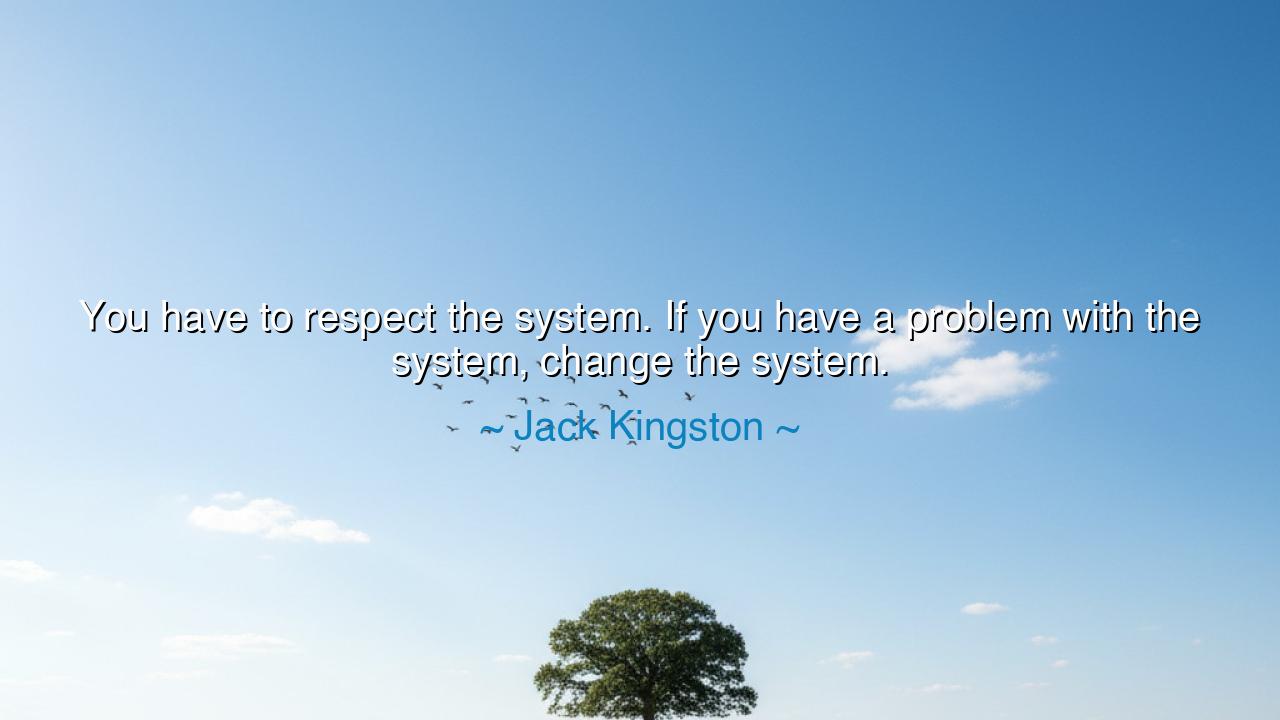
You have to respect the system. If you have a problem with the
You have to respect the system. If you have a problem with the system, change the system.






Hear, O seekers of truth, the words of Jack Kingston, who proclaimed: “You have to respect the system. If you have a problem with the system, change the system.” These words, though spoken in the realm of politics, echo far beyond it, carrying the weight of wisdom for all ages. For in every society, in every family, in every human endeavor, there exists a system—a structure of order, rules, and balance. To despise it without action is to fall into bitterness and futility. To honor it, and when necessary to labor for its transformation, is the way of courage and mastery.
The meaning of this utterance is plain yet profound. Kingston reminds us that systems, whether of law, of governance, or of custom, are not invincible idols, but living constructs shaped by human hands. To respect the system is to acknowledge its authority, for without order, chaos consumes. Yet to remain silent when it is unjust is cowardice. Therefore, he teaches a middle path: honor the existence of order, but when flaws are revealed, strive to change the system, not through destruction, but through reform, perseverance, and struggle.
The origin of these words springs from the eternal tension between stability and reform. Every age has seen men cry out against oppression, corruption, or stagnation. Some choose rebellion, shattering the system entirely, and in the ruins find only blood and chaos. Others bow their heads and accept what is, sinking into the sleep of slaves. But the wise recognize that true change is not born of fury alone, but of discipline—of reshaping the system from within, until it better serves justice and truth.
History offers many witnesses to this principle. Consider the life of Dr. Martin Luther King Jr. He lived under a system that denied basic rights to millions. Yet he did not turn to reckless destruction, nor did he accept silence. Instead, he respected the system enough to call the nation to its own ideals, and he changed the system through protest, persuasion, and sacrifice. His march was not against the concept of law, but against its misuse. By working within the structure, he reshaped it into something greater, and his legacy endures as a testament to Kingston’s wisdom.
So too did Mahatma Gandhi in India. He faced the crushing might of an empire. Yet he did not reject the idea of order itself; rather, he challenged the unjust system with nonviolent strength. By respecting the truth of human dignity, while resisting false authority, he led his people to freedom. Gandhi showed that to change the system is not always to wield the sword, but often to wield the power of conscience, discipline, and unity.
The emotional power of Kingston’s teaching lies in its demand for responsibility. It is easy to curse the world, to rail against injustice, to heap blame upon “the system.” But the harder path, the noble path, is to labor for change with wisdom and persistence. Systems bend not to empty anger, but to those who endure the long struggle, who stand firm through trials, and who bear the cost of transformation. Such souls become builders of a better world.
The lesson is clear: when you find fault in your community, your nation, or your life, do not despair and do not destroy blindly. First, respect the system, for without structure all collapses. Then, set your heart upon reform. Study its laws, speak with courage, gather allies, and take action. For only those who work with discipline and resolve can bring about lasting change.
Therefore, let this wisdom be engraved upon your heart: “Respect the system. If you have a problem with the system, change the system.” Do not be idle complainers, nor reckless destroyers, but steadfast reformers. Build where others tear down, strengthen where others abandon, and change what is unjust without discarding the whole. In this way, you shall not only live with dignity but leave behind a legacy of justice and order for generations yet to come.






AAdministratorAdministrator
Welcome, honored guests. Please leave a comment, we will respond soon